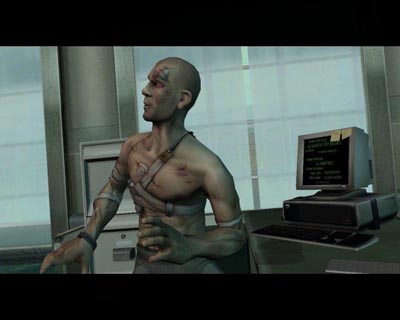
See part one of Brent’s story on the Xbox 360, and Microsoft’s decision to force developers to let users replace the game soundtrack with their own custom playlists. You’ve heard from the CDM staff, and we’ve heard from you, but what do game composers think? -PK
CDM took some time to speak with some of today’s leading game composers to see what they had to say about Xbox 360’s custom playlists. We spoke with four composers: Aaron Marks of On Your Mark Music Productions and author of The Complete Guide to Game Audio: For Composers, Musicians, Sound Designers, and Game Developers, Tim Larkin, composer for Cyan Worlds with credits including Riven
, Myst: Uru, and the forthcoming Myst V: End of Ages, Scott Cairns, composer for the forthcoming Stargate SG-1: The Alliance, and Christian Marcussen, who has worked on such notable titles as TimeSplitters: FuturePerfect and Second Sight
. Unfortunately, we were unable to reach any Microsoft representatives for comment. (read more)
CDM: As a composer, how do you feel about this decision? Will it have an impact on the future of the “game composer”?
SC: First impressions count for a lot when the player runs their game for the first time – I can’t imagine a developer sending out a game title with an inferior score. Imagine Star Wars beginning with cheesy MIDI music? It would lower the tone of the whole game! Secondly, I dont think a developer should work under the assumption that the music will be swapped out. Music budgets, although on the increase generally, are still a very small portion of the overall development cost of a game. It’s not a huge financial decision for them to include a first-class score with their title.
TL: It’s a nice feature, and for some players, it will be used quite a bit I’m sure.
But realistically, the music playing in your library isn’t tailored to
play with the game. It might be more enjoyable to play your own
selections, but I’m sure that the developers aren’t counting on
players to provide their own soundtracks. To me it’s comparable to a
level editor. Even though many games allow you to create your own
levels, I’ve yet to see a game that ships without them.
AM: I do see some games which might actually benefit from this. Sports games, like skateboarding, BMX titles or even race games would really add a new dimension for the player by letting them bring their own music to their experience – music which they may already listen to when doing these things in real life. These type of games already use licensed music to a great extent, and since this music wasn’t specifically written for the game, it could be replaced without any loss to the experience.
CM: From Microsoft’s point of view, and hopefully from a consumer’s point of view, I think it’s a smart move. With a little luck it will turn into a ‘best of both worlds’ scenario where games will have great scores, but users can add their own music if they should feel the need. I really doubt the apocalyptic vision that somehow this will make developers disregard music even more.
CDM: As a game player how do you think this decision will affect next generation games?

AM: As a game player, I like to experience what the developers of the game intend. That means listening to the music, sound effects and narratives while I play, letting them surprise me and evoke emotions they felt where important when playing the game. Because I do this for a living, I really appreciate an experience when they get it right. When they get it wrong, I go for the volume control. Some racing games made me wonder what they were thinking with some of the music they include and I’m pretty quick to turn it down. Having the capability as a player to play music I like for those types of games would definitely personalize the experience – but I can already do that now by muting the game and putting a CD in the stereo.
SC: On the other side of the coin though, the music we compose has to cover a lot of ground time-wise in a game. A 2 minute battle theme might play over and over again on a level that may take the player hours to complete. In this case, perhaps the player may welcome the opportunity to introduce their favourite music.
TL: Most players I’m sure will try out the existing game soundtrack before
substituting their own. If anything, it might be a nice break after
playing a game for 20 hours to hear something that you pick instead of
having the score be the only choice. It’s really about providing more
choices to the player, and that’s a good thing.
CDM: Will this decision by Microsoft affect the overall cinematic/emotional effect that so many game companies are striving to provide?
CM: I doubt it, for quite a few reasons. First of all developers will still strive to create this cinematic experience which includes having good, and interactive music. Secondly I guess that those gamers, who exchange the games music with their own, are likely the ones who don’t pay much attention to the score provided anyway. Sure those gamers will lose the cinematic feel of the game, but they will exchange it with something else which makes them happy.
SC: Certainly it could. A player will quickly realise how inappropiate some of their favourite bands sound in a gaming environment though! Perhaps it will work in our favour, after a player hears their own music out of context, perhaps the original score will sound just that much better.
TL: Music is an integral peice of the gaming world.The developers and
publishers know that. I really don’t see a day when a major game title
ships with a do-it-yourself soundtrack. I think they’d be cutting
their own throats with that philosophy.
AM: Game developers, and game players for that matter, are getting pretty smart about the audio part of the experience. Music provides such a powerful, emotional quality to our lives. Developers are trying to take advantage of what good music gives to their games and are paying handsomely to hire the best composers and orchestras to perform them. Game players expect nothing less for their hard earned money and demand, not only high quality audio, but music which will affect them personally. It’s going to take more than a new platform to change this mindset. Hollywood doesn’t give the movie goer a choice of music and this only makes sense in gaming.
The Final Cut
The Xbox 360 is still a ways off, and much is yet to be seen as far as how developers and composers take to this news. We are optimistic that developers and publishers will continue to see the increasing importance of audio in next generation titles. Likewise, the sophistication of today’s gamers is increasing, as is their appreciation for high-quality game audio. As musicians, composers, and audio-geeks of all kinds, it is a great time to be working in the industry, but we must remain firm in our belief that high-quality audio elevates the level of digital entertainment in the 21st Century.
[Advertisement]